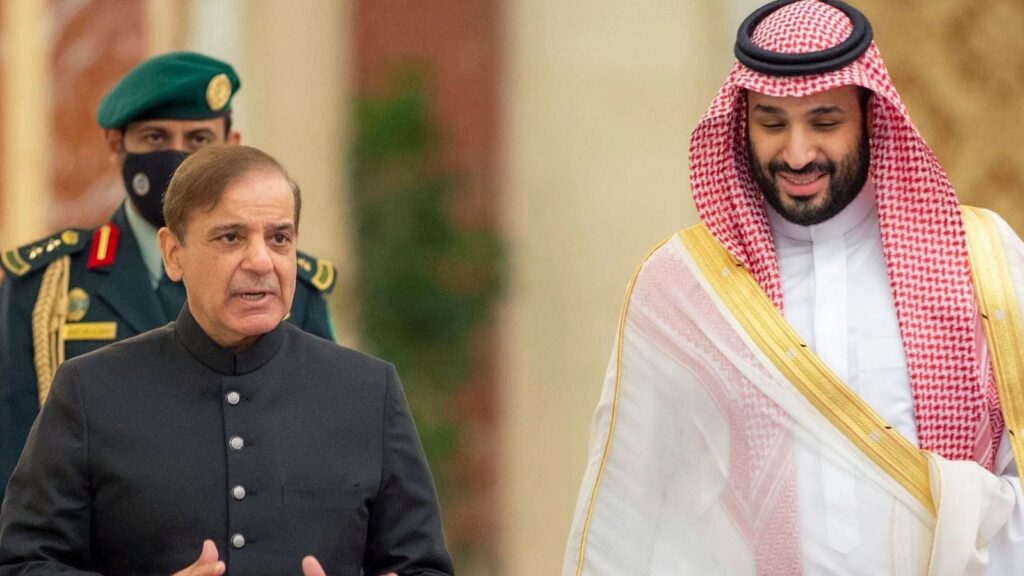New Delhi | September 18,2025 | SKY LINK TIMES
A newly signed Strategic Mutual Defence Agreement between Saudi-Pakistan Defence Pact has stirred unease in New Delhi, Washington, and Tel Aviv. The pact, inked in Riyadh by Pakistani Prime Minister Shehbaz Sharif and Saudi Crown Prince Mohammed bin Salman, formally strengthens military cooperation between the two nations, raising pressing questions about its potential impact on India-Saudi ties.

The agreement comes against the backdrop of the recent Operation Sindoor conflict between India and Pakistan, making it a development New Delhi is watching with caution.
Table of Contents
What the Saudi-Pakistan Defence Pact Entails
The accord of Saudi-Pakistan Defence Pact elevates Riyadh and Islamabad’s long-standing defence cooperation to a new institutional level. Its central clause—an attack on one country will be treated as an attack on both—echoes NATO-style commitments.
In a joint communiqué, both sides pledged to “develop aspects of defence cooperation” and “strengthen joint deterrence against any aggression.” For Pakistan, this represents a diplomatic victory; for Saudi Arabia, analysts say, it signals both deterrence and strategic hedging amid growing regional tensions.
India’s Response: Studying the Implications
India’s Ministry of External Affairs (MEA) acknowledged the deal but refrained from overreaction.
> “We have seen reports of the signing of a strategic mutual defence pact between Saudi Arabia and Pakistan. The Government was aware… We will study the implications of this development for our national security as well as regional and global stability,” the MEA said in a statement.
While reaffirming its commitment to safeguarding India’s interests, New Delhi highlighted the importance of monitoring the Riyadh-Islamabad axis closely in the months ahead.
Historical Context: Decades of Military Ties
Saudi-Pakistan Defence Pact ties are not new. Since the 1960s, Pakistan has trained Saudi personnel, conducted joint military exercises, and provided security expertise. In return, Riyadh has extended economic and energy assistance to Islamabad.
Speculation has long persisted about Saudi Arabia’s interest in Pakistan’s nuclear weapons programme, with many analysts suggesting Riyadh quietly funded aspects of it. Some experts argue the new pact could, at least symbolically, reaffirm Saudi Arabia’s access to Pakistan’s “nuclear umbrella.”
Also Read:https://skylinktimes.in/indias-1st-lanza-n-radar-tata-advanced-systems/
Timing of the Deal: Regional Volatility
The pact was signed amid rising instability:
Just days before, 26 people were killed in the Pahalgam terror attack in India, prompting New Delhi’s Operation Sindoor against militant bases in Pakistan and PoK.
The Middle East remains tense following an Israeli airstrike in Doha that killed senior Hamas figures, triggering widespread condemnation across Arab capitals.
Broader Gulf realignments, strained U.S.-Saudi relations, and Pakistan’s domestic crises have further shaped the deal’s timing.
Impact on India-Saudi Relations
Despite the bold language, experts caution against overestimating the pact’s practical effect. For Riyadh, trade with India—valued at USD 42 billion annually—far outweighs its economic engagement with Pakistan, which stands around USD 5 billion.
A senior Saudi official reassured India, telling Reuters the agreement was “not directed at any specific country or event” and emphasized that Saudi-India ties are “more robust than ever.”
Outlook
While the Saudi-Pakistan Defence Pact carries symbolic weight and enhances Pakistan’s diplomatic leverage, Riyadh is expected to tread cautiously, avoiding any direct confrontation with India. The deal may be more about regional signaling—particularly toward Israel and Iran—than preparing for active military commitments.
For New Delhi, however, the development is a reminder of the complex triangular dynamics between India, Pakistan, and Saudi Arabia in a volatile strategic landscape.
For More Info Stay Tuned: https://skylinktimes.in



